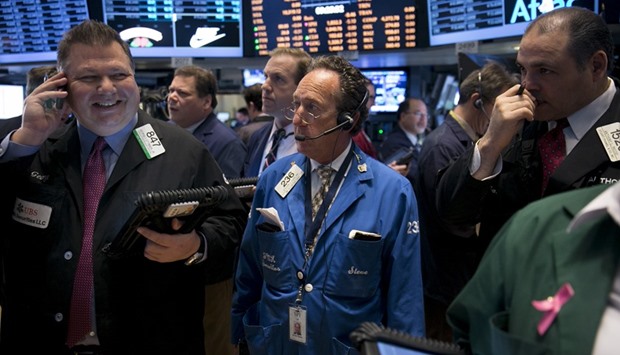US stocks fell for a second week, joining a selloff in global equities as traders worldwide fled exchange-traded funds linked to the asset class.
The S&P 500 Index slid 0.4% in the five days, capping its biggest two-week retreat since February as signs of slowing growth in the world’s largest economy mounted. Worldwide stock ETFs lost $12.6bn in the four days through May 5, wiping out more than six weeks of inflows, as the MSCI All- Country World Index capped its worst week in three months.
The withdrawals highlighted the lack of faith in the rally that helped stocks briefly erase their annual losses last month. Equity traders have remained on the sidelines, with volume down in recent weeks as investors sought safer assets such as gold. Friday’s US jobs report did nothing to allay lingering worries over weak economic expansion and the efficacy of unprecedented central-bank policies.
“There hasn’t been any truly positive macroeconomic news to remain bullish on equities, and there are a few roadblocks coming up that could prevent a sustained rally,” said Antoine Lesne, the head of ETF sales strategy for Europe, the Middle East and Africa at State Street Global Advisors in London.
“The market is becoming more cautious and using ETFs to allocate tactically. We’ll probably continue to see more flows into gold and less into equities.”
The $5.3bn pulled from State Street’s SPDR S&P 500 ETF Trust represented more than 40% of the total withdrawals recorded in the first days of the month, according to data compiled by Bloomberg tracking funds of more than $100mn. Underscoring the flight from risk assets, BlackRock’s iShares iBoxx $ High Yield Corporate Bond ETF also saw outflows as traders yanked $2.3bn from it.
Instead, they poured more than $1bn in the SPDR Gold Shares and almost $540mn in the iShares TIPS ETF, which tracks inflation-protected Treasury notes.
The MSCI All-Country World Index lost 1.9% in the past five sessions, for the first back-to-back weekly slides since February 12. While some markets in Europe and Japan had a shortened week because of local holidays, regional benchmark gauges also posted their biggest declines since February, sliding more than 2.8%.
The economic slowdown in China and the path of monetary policy at the Federal Reserve, Bank of Japan and European Central Bank are some of the major issues leaving investors hesitant to make stock bets. But those are not the only concerns: the upcoming elections in the US and Spain and the UK vote on European Union membership are also on traders’ minds.
“There are a lot of things going on in the market right now, and investors are reacting to that,” said Deborah Fuhr, a former ETF research head at BlackRock who helped found London-based research firm ETFGI.
“Investors are moving toward safer havens. Clearly gold is for many the safe haven, long-term store of wealth and inflation hedge.” To be sure, the outflows represent less than 1% of the total $1.9tn in stock ETFs, which are still by far the most widely owned fund asset class.
At a time when trading volume has dried up across equity, currency and fixed-income markets, ETFs remain an oasis of liquidity.
Still, the MSCI index of global shares has erased about a quarter of its rebound from the mid-February low, closing 11% below last year’s record.
Equity mutual funds have lost more than $27bn this year, according to a Bank of America Corp note citing EPFR Global data. “There’s clearly a flight to safety, though some of it is probably profit taking,” said Christopher Johnson, the vice-president of ETF sales and strategy for the Americas at Macquarie Capital (USA) in New York.
“On the one side, some say things are much better than people think and the markets are coming back, while on the other people are very guarded and concerned.
There are so many headline risks out there that it’s causing investors, particularly in the institutional space, to hesitate.”

Traders work on the floor of the New York Stock Exchange (file). US stocks fell for a second week, joining a selloff in global equities as traders worldwide fled exchange-traded funds linked to the asset class.
